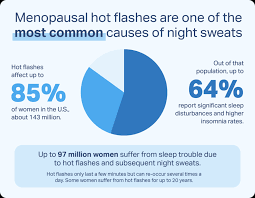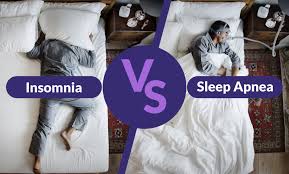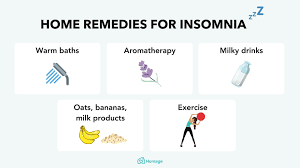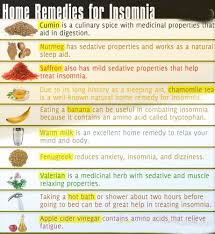Menopause Insomnia Treatment: Strategies for Better Sleep
Menopause is a natural stage in a woman’s life that brings about various physical and hormonal changes. One common symptom that many women experience during menopause is insomnia. Insomnia can be frustrating and impact overall well-being, but there are effective strategies to manage menopause-related sleep disturbances.
Establish a Bedtime Routine
Creating a consistent bedtime routine can signal to your body that it’s time to wind down and prepare for sleep. This routine can include activities such as reading a book, taking a warm bath, or practicing relaxation techniques like deep breathing or meditation.
Maintain a Comfortable Sleep Environment
Ensure that your bedroom is conducive to sleep by keeping the room dark, quiet, and at a comfortable temperature. Invest in a supportive mattress and pillows to promote better sleep quality.
Manage Stress and Anxiety
Menopause can be a stressful time for many women, which can contribute to insomnia. Practice stress-reducing techniques such as yoga, mindfulness, or talking to a therapist to help manage anxiety levels and promote better sleep.
Limit Stimulants Before Bedtime
Avoid stimulants like caffeine and nicotine in the hours leading up to bedtime, as they can interfere with your ability to fall asleep. Opt for herbal teas or warm milk instead to promote relaxation.
Consider Hormone Therapy
In some cases, hormone therapy prescribed by a healthcare provider may help alleviate menopause symptoms, including insomnia. Discuss the potential benefits and risks of hormone therapy with your doctor.
Consult with a Healthcare Provider
If you’re struggling with severe insomnia during menopause, it’s important to consult with a healthcare provider who can provide personalized recommendations and treatment options tailored to your specific needs.
By incorporating these strategies into your daily routine and seeking support from healthcare professionals when needed, you can effectively manage menopause-related insomnia and improve your overall quality of sleep during this transitional phase of life.
Managing Sleep Disturbances: A Guide to Understanding and Treating Menopause-Related Insomnia
- What causes insomnia during menopause?
- How can I improve my sleep quality during menopause?
- Are there any natural remedies for menopause-related insomnia?
- Should I consider hormone therapy to treat menopause insomnia?
- What lifestyle changes can help alleviate menopause insomnia?
- When should I consult a healthcare provider about my menopause-related sleep problems?
What causes insomnia during menopause?
Insomnia during menopause can be attributed to various factors related to the hormonal changes that occur during this stage of life. Fluctuations in estrogen and progesterone levels can disrupt the body’s internal clock, leading to difficulties falling asleep and staying asleep. Additionally, hot flashes and night sweats, common symptoms of menopause, can trigger awakenings during the night and contribute to sleep disturbances. Emotional factors such as stress, anxiety, and mood swings that often accompany menopause can also play a role in exacerbating insomnia symptoms. Understanding these underlying causes of insomnia during menopause is crucial in developing effective treatment strategies to improve sleep quality and overall well-being.
How can I improve my sleep quality during menopause?
Improving sleep quality during menopause is a common concern for many women experiencing this transitional phase. To address menopause-related insomnia, consider establishing a consistent bedtime routine to signal to your body that it’s time to wind down. Creating a comfortable sleep environment by keeping your bedroom dark, quiet, and at a comfortable temperature can also promote better sleep. Managing stress and anxiety through relaxation techniques like yoga or mindfulness can help calm the mind and improve sleep quality. Additionally, limiting stimulants before bedtime and discussing potential hormone therapy options with a healthcare provider are strategies that can contribute to enhancing your sleep quality during menopause.
Are there any natural remedies for menopause-related insomnia?
For those seeking natural remedies to alleviate menopause-related insomnia, several options may help improve sleep quality. Herbal supplements like valerian root, chamomile tea, and melatonin have been known to promote relaxation and aid in falling asleep. Incorporating mindfulness practices such as meditation or gentle yoga before bedtime can also help calm the mind and prepare the body for rest. Additionally, maintaining a consistent sleep schedule, staying physically active during the day, and avoiding stimulating activities close to bedtime can contribute to better sleep hygiene and potentially reduce menopause-related insomnia symptoms. It’s essential to consult with a healthcare provider before trying any new natural remedies to ensure they are safe and appropriate for individual needs.
Should I consider hormone therapy to treat menopause insomnia?
When considering hormone therapy as a treatment for menopause insomnia, it is important to weigh the potential benefits and risks carefully. Hormone therapy can be effective in alleviating menopause symptoms, including insomnia, by regulating hormonal imbalances. However, hormone therapy is not without risks and side effects, such as an increased risk of certain health conditions like blood clots or breast cancer. It is crucial to consult with a healthcare provider to discuss your individual health history, symptoms, and treatment options to determine if hormone therapy is the right choice for managing menopause-related insomnia.
What lifestyle changes can help alleviate menopause insomnia?
Making lifestyle changes can significantly help alleviate menopause insomnia. Simple adjustments such as establishing a consistent bedtime routine, creating a comfortable sleep environment, managing stress through relaxation techniques, limiting stimulants before bedtime, and incorporating regular exercise into your routine can have a positive impact on sleep quality during menopause. These lifestyle changes can promote relaxation, reduce anxiety, and signal to your body that it’s time to rest, ultimately improving your ability to fall asleep and stay asleep throughout the night.
When should I consult a healthcare provider about my menopause-related sleep problems?
If you are experiencing persistent and severe menopause-related sleep problems that significantly impact your daily functioning and quality of life, it is advisable to consult a healthcare provider. Symptoms such as chronic insomnia, frequent awakenings during the night, excessive daytime fatigue, and difficulty concentrating may indicate a more serious underlying issue that requires professional evaluation and treatment. A healthcare provider can help assess your symptoms, identify potential causes of insomnia related to menopause, and recommend appropriate interventions to improve your sleep quality and overall well-being. Early intervention and management of menopause-related sleep problems can lead to better outcomes and a smoother transition through this natural phase of life.




